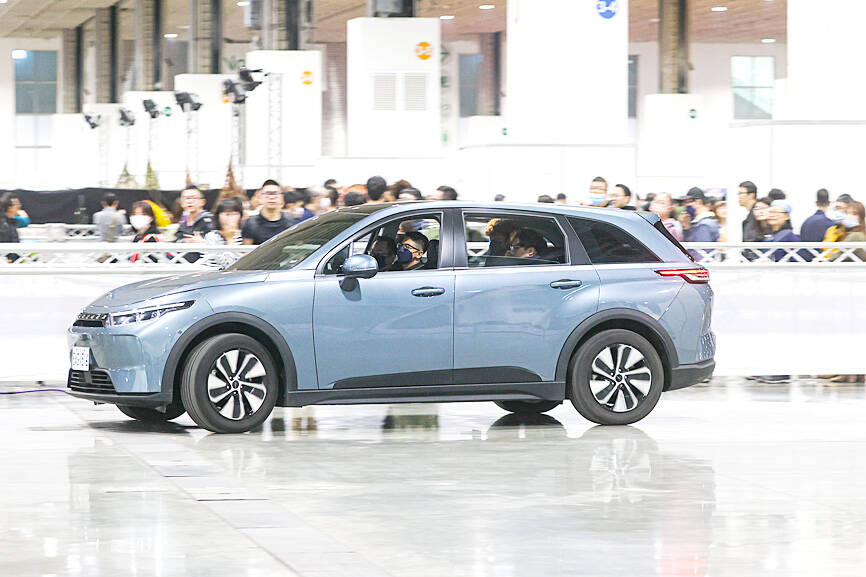Yulon Motor Co (裕隆汽車) yesterday released a positive growth projection for revenue this year, thanks to increasing shipments of its first electric vehicle (EV) model based on the MIH Open EV Platform developed by Hon Hai Precision Industry Co (鴻海精密), also known as Foxconn.
Yulon started shipping the electric sports utility vehicle Luxgen n7 earlier this year with shipments totaling 500 units in the first quarter, Yulon Motor spokesman Steven Lo (羅文邑) told investors during a virtual conference.
“In March and April, we expedited shipments to 1,200 to 15,000 units a month,” Lo said. “With higher shipments from the second quarter, we expect to complete the 9,000 Luxgen n7s in preorders by the third quarter.”

Photo: CNA
Yulon manufactures the electric vehicle while its subsidiary, Luxgen Motor Co (納智捷汽車), sells it. Luxgen has received about 20,000 n7 preorders since September 2022 and plans to accept second-wave orders from next month or June, Lo said.
Luxgen n7 is designed and based on the Model C EV developed by Foxtron Vehicle Technologies Co (鴻華先進), a joint EV venture between Hon Hai and Yulon.
“We are positive about the company’s revenue outlook, with Luxgen n7 being a major highlight of the year,” Lo said.
He said Yulon and Luxgen are discussing plans to introduce new EV models later this year, but did not elaborate.
Hon Hai last month said the new-generation Model B electric car, also designed by Foxtron, would be ready for mass production and open for preorders at the end of this year.
Regarding speculation that Yulon might distribute Chinese EVs made by BYD Co (比亞迪) and Chery Automobile Co (奇瑞汽車) in Taiwan, Lo said the company does not rule out any possibility of making vehicles for other brands, but has no substantial plans to partner with Chinese companies.
Yulon’s consolidated revenue last year expanded 6.54 percent to NT$82.12 billion (US$2.53 billion) from NT$77.08 billion in 2022, partly helped by its auto financing business operated by another subsidiary, Taiwan Acceptance Corp (裕融). Net income improved to NT$8.04 billion last year, reversing a loss of NT$469 million the previous year.
Lo said Yulon’s gross margin this year should stay at a similar level to last year when it fell slightly to 35 percent from 36 percent in 2022.

Hon Hai Precision Industry Co (鴻海精密) yesterday said that its research institute has launched its first advanced artificial intelligence (AI) large language model (LLM) using traditional Chinese, with technology assistance from Nvidia Corp. Hon Hai, also known as Foxconn Technology Group (富士康科技集團), said the LLM, FoxBrain, is expected to improve its data analysis capabilities for smart manufacturing, and electric vehicle and smart city development. An LLM is a type of AI trained on vast amounts of text data and uses deep learning techniques, particularly neural networks, to process and generate language. They are essential for building and improving AI-powered servers. Nvidia provided assistance

STILL HOPEFUL: Delayed payment of NT$5.35 billion from an Indian server client sent its earnings plunging last year, but the firm expects a gradual pickup ahead Asustek Computer Inc (華碩), the world’s No. 5 PC vendor, yesterday reported an 87 percent slump in net profit for last year, dragged by a massive overdue payment from an Indian cloud service provider. The Indian customer has delayed payment totaling NT$5.35 billion (US$162.7 million), Asustek chief financial officer Nick Wu (吳長榮) told an online earnings conference. Asustek shipped servers to India between April and June last year. The customer told Asustek that it is launching multiple fundraising projects and expected to repay the debt in the short term, Wu said. The Indian customer accounted for less than 10 percent to Asustek’s

‘DECENT RESULTS’: The company said it is confident thanks to an improving world economy and uptakes in new wireless and AI technologies, despite US uncertainty Pegatron Corp (和碩) yesterday said it plans to build a new server manufacturing factory in the US this year to address US President Donald Trump’s new tariff policy. That would be the second server production base for Pegatron in addition to the existing facilities in Taoyuan, the iPhone assembler said. Servers are one of the new businesses Pegatron has explored in recent years to develop a more balanced product lineup. “We aim to provide our services from a location in the vicinity of our customers,” Pegatron president and chief executive officer Gary Cheng (鄭光治) told an online earnings conference yesterday. “We

LEAK SOURCE? There would be concern over the possibility of tech leaks if TSMC were to form a joint venture to operate Intel’s factories, an analyst said Taiwan Semiconductor Manufacturing Co (TSMC, 台積電) yesterday stayed mum after a report said that the chipmaker has pitched chip designers Nvidia Corp, Advanced Micro Devices Inc and Broadcom Inc about taking a stake in a joint venture to operate Intel Corp’s factories. Industry sources told the Central News Agency (CNA) that the possibility of TSMC proposing to operate Intel’s wafer fabs is low, as the Taiwanese chipmaker has always focused on its core business. There is also concern over possible technology leaks if TSMC were to form a joint venture to operate Intel’s factories, Concord Securities Co (康和證券) analyst Kerry Huang (黃志祺)